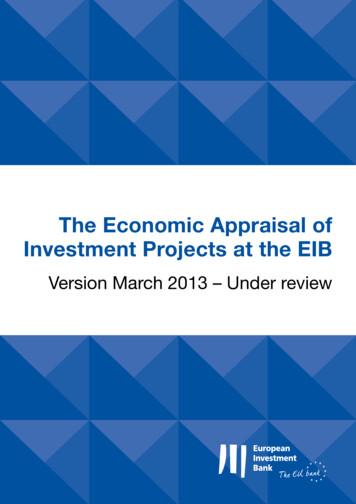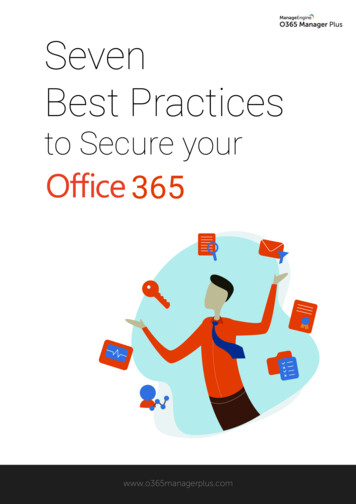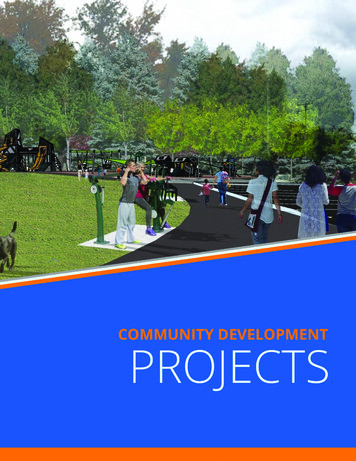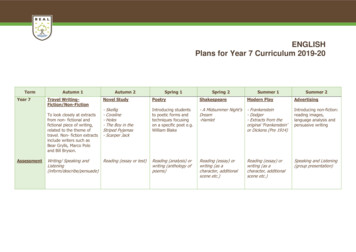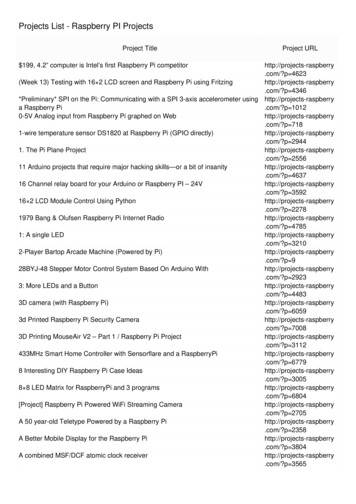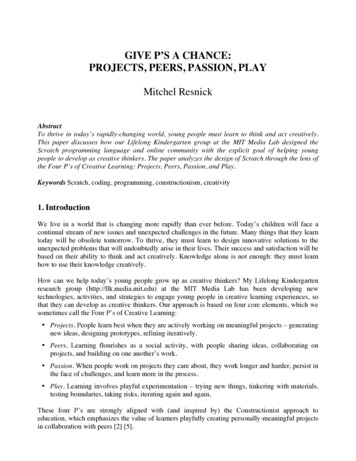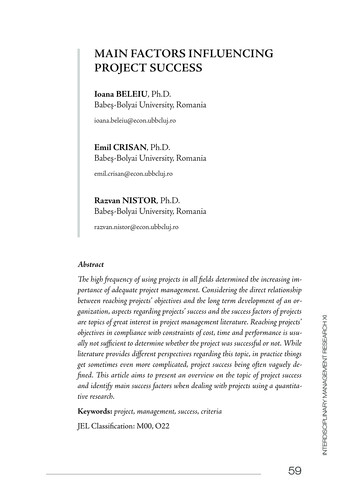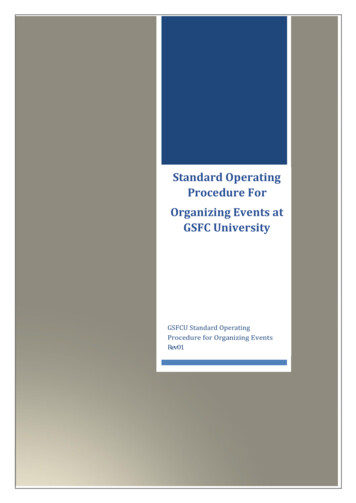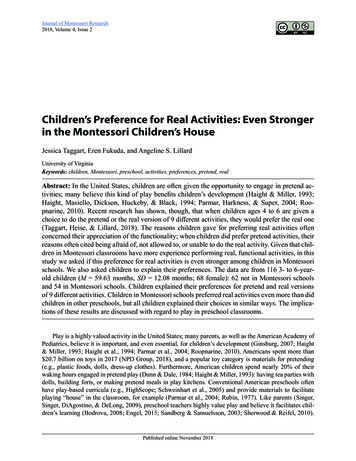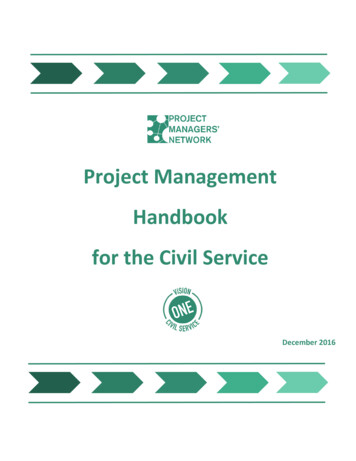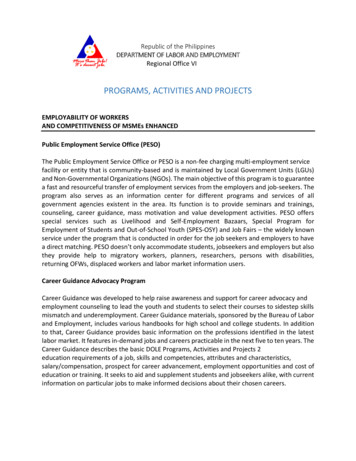
Transcription
Republic of the PhilippinesDEPARTMENT OF LABOR AND EMPLOYMENTRegional Office VIPROGRAMS, ACTIVITIES AND PROJECTSEMPLOYABILITY OF WORKERSAND COMPETITIVENESS OF MSMEs ENHANCEDPublic Employment Service Office (PESO)The Public Employment Service Office or PESO is a non-fee charging multi-employment servicefacility or entity that is community-based and is maintained by Local Government Units (LGUs)and Non-Governmental Organizations (NGOs). The main objective of this program is to guaranteea fast and resourceful transfer of employment services from the employers and job-seekers. Theprogram also serves as an information center for different programs and services of allgovernment agencies existent in the area. Its function is to provide seminars and trainings,counseling, career guidance, mass motivation and value development activities. PESO offersspecial services such as Livelihood and Self-Employment Bazaars, Special Program forEmployment of Students and Out-of-School Youth (SPES-OSY) and Job Fairs – the widely knownservice under the program that is conducted in order for the job seekers and employers to havea direct matching. PESO doesn’t only accommodate students, jobseekers and employers but alsothey provide help to migratory workers, planners, researchers, persons with disabilities,returning OFWs, displaced workers and labor market information users.Career Guidance Advocacy ProgramCareer Guidance was developed to help raise awareness and support for career advocacy andemployment counseling to lead the youth and students to select their courses to sidestep skillsmismatch and underemployment. Career Guidance materials, sponsored by the Bureau of Laborand Employment, includes various handbooks for high school and college students. In additionto that, Career Guidance provides basic information on the professions identified in the latestlabor market. It features in-demand jobs and careers practicable in the next five to ten years. TheCareer Guidance describes the basic DOLE Programs, Activities and Projects 2education requirements of a job, skills and competencies, attributes and characteristics,salary/compensation, prospect for career advancement, employment opportunities and cost ofeducation or training. It seeks to aid and supplement students and jobseekers alike, with currentinformation on particular jobs to make informed decisions about their chosen careers.
National Skills Registration Program (NSRP)National Skills Registry Program or commonly known by its acronym NSRP is the government’sonline manpower database. The government invites workers all over the country to register inPublic Employment Information System (PEIS) to make themselves visible to the employers. PEISis launched to ease poverty through substantial employment. Using the PEIS, the list of availableworkers in the country could be easily tracked down as well as the lists of establishments withvacancies. The said program is connected to the PhilJobNet, the government’s online job portal,which is open for public access thus bringing job seekers, recruitment agencies, and local andforeign employers all in one place. PEIS will serveas a bank of information on skills and accreditations, licensures, and local and overseasemployment.Special Program for the Employment of Students (SPES)Mandated under RA 10917, Special Program for the Employment of Students (SPES) is an act thatis commonly known as an avenue to help those poor but deserving students in finding ways tocater some of their needs financially. Its objective is to hone and develop the skills and potentialsof the youth for the country’s well-being. Before, the program was only offered during summerand December breaks but as the demand for the assistance rises, the program is now offered allyear round. Employers pay only 60% of the minimum salary while the remaining 40% isshouldered by the Department of Labor and Employment. SPES is open to all 15-30 year-old highschool, college or vocational students or drop-outs and interested employers.JobStartJobstart Philippines is a DOLE implemented project in partnership with the Asian DevelopmentBank and the government of Canada. It is being implemented through the local PESO offices ofthe target areas. Qualified “JobStarters” will undergo ten days of life skills training (a 10-daytraining which mainly focused on attitudes to work and workplace environment, job hunting skillsand networking, personal branding and interpersonal skills, and health and financialmanagement), up to three months of JobStart-funded technical training and another threemonths of work experience with a “matched” employer/establishment. The interns in return willbe receiving at least 75% of the minimum wage in the relevant city/municipality.
PROTECTION OF WORKERS’ RIGHTS AND MAINTENANCE OFINDUSTRIAL PEACE ENSUREDLabor Inspection ProgramFormulated to operationalize the constitutional mandate to protect the interest and welfare ofthe employees towards the promotion of social justice and maintenance of industrial peacethrough the encouragement of voluntary compliance and enforcement of labor laws. Assessmentrefers to the determination of compliance by establishments with all Labor Laws, which includethe General Labor Standards (GLS), Occupational Safety and Health Standards (OSHS) and otherrelated labor laws and issuances.Single Entry Approach (SEnA)SEnA is an administrative approach to provide a speedy, impartial, inexpensive, and accessiblesettlement procedure of all labor issues or conflicts to prevent them from ripening into full-blowndisputes or actual labor cases. It was first introduced through Department Order 107-10 and laterinstitutionalized through the enactment of Republic Act 10396 in 2013 providing for30-daymandatory conciliation-mediation for issues arising from labor and employment (i.e., governedby employee-employer relations).As a form of conciliation-mediation intervention, the main objective is to effect amicablesettlement of the dispute among the differing parties wherein a neutral party, the SEnA DeskOfficer (SEADO), assists the parties by giving advice, or offering solutions and alternatives to theproblems.Registration and PermitsContractor and Sub-Contractor (D.O. 174)The key concept of the contracting and sub-contracting arrangements is to secure theemployment and rights of the workers to just and humane conditions of work, security of tenure,self-organization and collective bargaining. Such rules cover all parties of contracting andsubcontracting arrangements where an employer-employee relationship exists. Examples ofparties involve in these arrangements are manpower agencies, janitorial services, and securityand allied agencies. These parties are mainly involved on putting out or farming out with acontractor the performance or completion of a specific job, work or services within a specifiedperiod of time. They are just limited to these acts and are prohibited from engaging inrecruitment and placement activities, whether for local or overseas employment.All registrations must be transacted at Field Offices/Regional Offices of the Department of Laborand Employment to where it principally operates.
Alien Employment Permit (AEP)An Alien Employment Permit (AEP) is a document issued by the Secretary of Labor andEmployment through the DOLE – Regional Director, who has jurisdiction over the intended placeof work of the foreign national, authorizing the foreign national to work in the Philippines.Foreign nationals who are seeking employment in the country whether they are non-residentsor refugees, who are allowed to practice their profession in the country under reciprocity andother international agreements and consultancy, are required to apply for an AEP. Basically, AEPis created in order for the foreign nationals to work in the Philippines but holding only thosepositions that could not be done by Filipino workers or professions that are not yet available inthe country. This is to ensure the employment of Filipino workers and to avoid competitionagainst foreign nationals.Working Child PermitWorking Child Permit is issued to a child 15 years old and below to prevent the child’sexploitation and discrimination such as payment of minimum wage, hours of work and otherterms and conditions required by law and shall ensure the protection, health, safety, morals andnormal development of the child during the course of his/her employment. Moreover, this is tomake certain that the child’s employment will not involve production materials promotingalcoholic beverages, intoxicating drinks, tobacco and its by-products or exhibiting violence in anypublic entertainment or information.Construction Safety and Health Program (CSHP)Construction Safety and Health Program (CSHP) is one of the important provisions in D.O 13 andJAO-MOA signed by the Department of Labor and Employment (DOLE), Department of PublicWorks and Highways (DPWH), Department of Interior and Local Government (DILG), Departmentof Trade and Industry (DTI) and Professional Regulation Commission (PRC). It aims to promotethe safety and health of construction workers and avert the recurrence of construction-relatedincidents by requiring the contractors to secure an approved CSHP from the DOLE before aninfrastructure project commences.Tripartite Industrial Peace Council (TIPC)Tripartite Industrial Peace Council (TIPC) is established to serve as a continuing forum fortripartite advisement and consultation to aid in the streamlining the role of the government, thusempowering workers and employers organizations, enhancing their respective rights, andthereby, attaining industrial peace and improved productivity. Its main function is to monitor theimplementation and compliance of all concerned sectors the provisions of all tripartiteinstruments, conventions, declarations, codes of conduct and social accords. TIPC is establishedin national, regional and industrial wide with representatives from the government, workers and
employers. TIPC is also functioned to review labor laws, economic and social policies,recommendations and proposals, and serve as a communication channel and a mechanism inundertaking joint programs among the government, workers and employers toward enhancinglabor management relations.SOCIAL PROTECTION FOR VULNERABLE WORKERS STRENGTHENEDDOLE Integrated Livelihood and Emergency Employment Program (DILEEP)DOLE Integrated Livelihood and Emergency Employment Program is a project that helps inmaking existing livelihood transform into viable and sustainable business or communityenterprise by maximizing the community resources and skills. It enhances, restores and formslivelihood through trainings onproductivity improvement, workers’ safety and health, entrepreneurship development, and thelikes, networking and business alliance and social protection advocacy. The integrated assistancewill allow the economic undertaking to transform from a mere subsistence family livelihoodundertaking to a community or micro-enterprise managed by community group. The programcan be availed by utilizing other program components including Training-cum-Production andCommon Service Facility.Tulong Pangkabuhayan sa ating Displaced Workers (TUPAD)A community-based (municipality/barangay) package of assistance that provides emergencyemployment for displaced workers, the underemployed and the unemployed poor for amaximum of 30 days, depending on the nature of work. Only one member of a household shallbe accommodated to extend the benefits to the most number of households. A worker who hasbeen employed under the TUPAD program shall not be eligible for repeat employment within agiven year.Government Internship Program (GIP)GIP is a DOLE program that aims to provide young workers, particularly the poor/indigentand young workers, opportunity to demonstrate their talents and skills in the field of publicservice with the ultimate objective of attracting the best and the brightest who want to pursue acareer in government service, particularly in the fields and disciplines related to labor andemployment. Government Interns are granted a stipend of 75% of the region's minimum wage.Child Labor Prevention and Elimination Program (CLPEP)Pursuant to RA 9231, An Act Providing for the Elimination of the Worst Forms of Child Labor andAffording Stronger Protection for the Working Child, Amending for this Purpose Republic Act No.
7610, As Amended, Otherwise Known as the “Special Protection of Children Against Child Abuse,Exploitation and Discrimination Act,” the DOLE has the following programs and services:Provision of livelihood assistance to parents of child laborers or children-at-risk ofbecoming child laborers Provision of educational assistance to child labor victims or children at risk of becomingchild laborers Act as a lead agency in the rescue of child laborers under the National Program AgainstChild Labor (NPACL) which aims to respond to cases of child labor in extremely abjectconditions Advocacy activities which will strengthen the monitoring of child labor activities in thelocal communities thereby creating of child labor-free barangay and affording servicesand protection to children
service with the ultimate objective of attracting the best and the brightest who want to pursue a career in government service, particularly in the fields and disciplines related to labor and employment. Government Interns are granted a stipend of 75% of the region's minimum wage. Child Labor Prevention and Elimination Program (CLPEP)

